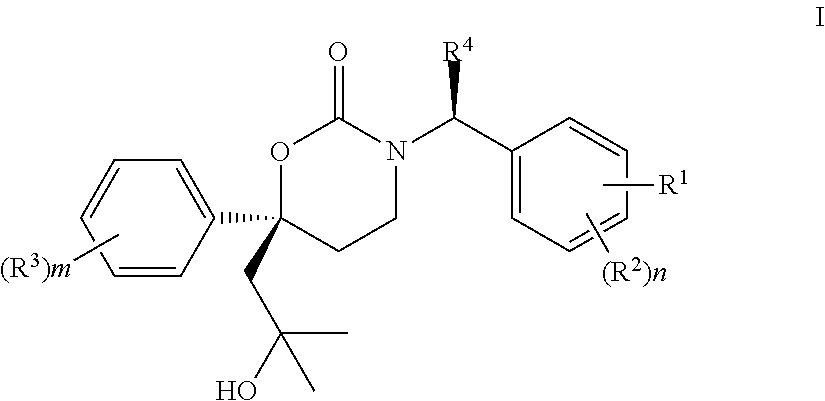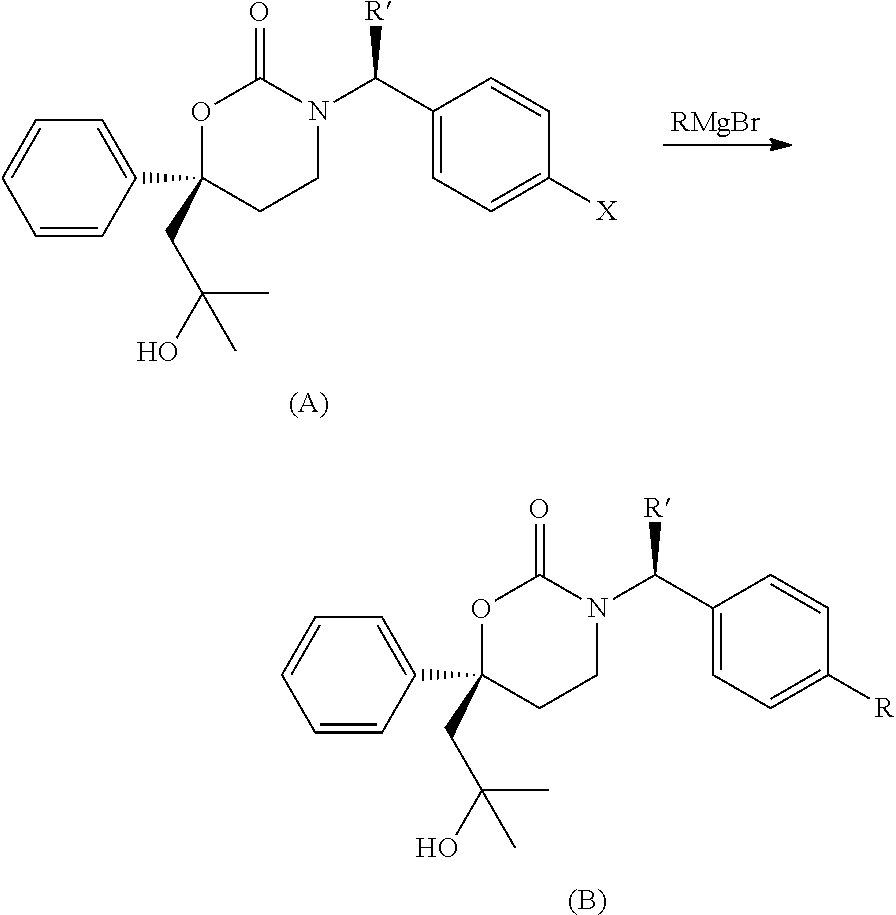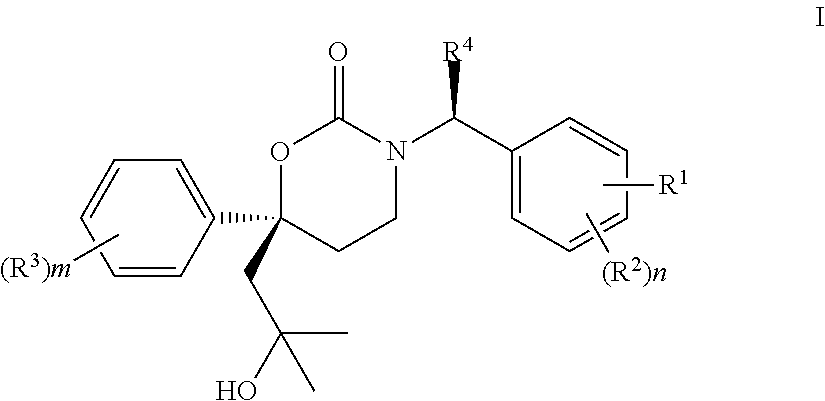Methods of making diastereomeric organic compounds
a diastereomeric and organic compound technology, applied in the field of making diastereomeric organic compounds, can solve the problems of other known methods and large-scale preparations, and achieve the effect of reducing the number of diastereomeric organic compounds
- Summary
- Abstract
- Description
- Claims
- Application Information
AI Technical Summary
Benefits of technology
Problems solved by technology
Method used
Image
Examples
example 1
Preparation of (S)-3-((S)-1-(4-bromophenyl)ethyl)-6-(2-hydroxy-2-methylpropyl)-6-phenyl-1,3-oxazinan-2-one (6)
[0118]
Step 1. Preparation of (S)-2-bromo-N-(1-(4-bromophenyl)ethyl)acetamide (1)
[0119]
[0120]A solution of (S)-(4-bromophenyl)ethylamine (100.0 g, 0.50 mol; >99% chiral purity) and toluene (500 mL) is treated with a solution of NaOH (30.0 g, 0.75 mol) in water (500 mL). The resultant mixture is cooled to about 5° C. and treated with bromoacetyl bromide (52.2 mL, 0.60 mol). The reaction mixture is allowed to warm to about 25° C. over 1 hour. The solid is filtered and washed with water and heptane. The solid is then dried under vacuum at about 55° C. for 18 hours to provide 1 as a white solid. Yield: 156.4 g, 95.6%.
Step 2. Preparation of 3-methyl-1-phenyl-3-(trimethylsilyloxy)butan-1-one (2)
[0121]
[0122]A flask is charged with THF (1 L), cooled to −50° C., and treated with lithium diisopropylamide (LDA) (1.05 L, 1.89 mol, 1.1 equiv, 1.8M in THF / heptane / ethylbenzene). The reactor...
example 2
[0132]Example 2 describes an alternative preparation of (S)-6-((S)-1-(4-bromophenyl)ethylamino)-2-methyl-4-phenylhexane-2,4-diol (4) described in Step 4 of Example 1 above.
Step 1. Synthesis of 2-allyl-1,3,2-dioxaborinane (7)
[0133]
[0134]A reactor is purged with N2 and charged with 2M allylmagnesium chloride in THF (850 mL, 1.7 mol), anhydrous THF (755.7 g, 850 mL, 10.48 mol) and methyl-t-butyl ether (629.0 g, 850 mL, 7.1 mol), cooled to −65° C., and treated with trimethylboronate (176.7 g, 1.7 mol) while maintaining a temperature of less than −60° C. The resultant milky solution is maintained at −55 to −60° C. for 30 minutes and slowly warmed to 0° C. over 30 minutes. The mixture is then treated with acetyl chloride (120.1 g, 1.53 mol) while maintaining a temperature of less than 5° C. The mixture is allowed to slowly warm to about 20° C. over 30 minutes and treated with 1,3-propanediol (116.4 g, 1.53 mol). The reaction mixture is maintained at about 20° C. for 6 hours, concentrated ...
example 3
Preparation of (R)-3,3′-difluoro-1,1′-binaphthyl-2,2′-diol (10)
[0141]
Step 1: Synthesis of (R)-2,2′-bis(methoxymethoxy)-1,1′-binaphthyl (11)
[0142]
[0143]A solution of (R)-1,1′-binaphthyl-2,2′-diol (30 g, 0.10 mol) in THF (200 ml) is added to a stirred slurry of 60 wt % NaH (10.48 g, 0.26 mol) in THF (100 mL) at 0-10° C. The mixture is stirred for 1 hour and treated with chloro(methoxy)methane (MOMCl) (20.25 g, 0.25 mol) while maintaining the temperature below 10° C. The resultant mixture is stirred for 1 hour at 0-5° C. then treated with water (100 mL) to quench the reaction. The organic phase is collected and the aqueous phase extracted with EtOAc (2×250 mL). The combined organics layers are washed with water (200 mL) and concentrated. The resultant pale yellow solid is then slurried in 10:1 (vol / vol) hexane / EtOAc. The solids are collected by filtration and dried under reduced pressure top provide 11. Yield: 38.5 g, 98%.
Step 2: Synthesis of (R)-3,3′-difluoro-2,2′-bis(methoxymethoxy)-...
PUM
| Property | Measurement | Unit |
|---|---|---|
| temperature | aaaaa | aaaaa |
| temperature | aaaaa | aaaaa |
| chiral purity | aaaaa | aaaaa |
Abstract
Description
Claims
Application Information
 Login to View More
Login to View More - R&D
- Intellectual Property
- Life Sciences
- Materials
- Tech Scout
- Unparalleled Data Quality
- Higher Quality Content
- 60% Fewer Hallucinations
Browse by: Latest US Patents, China's latest patents, Technical Efficacy Thesaurus, Application Domain, Technology Topic, Popular Technical Reports.
© 2025 PatSnap. All rights reserved.Legal|Privacy policy|Modern Slavery Act Transparency Statement|Sitemap|About US| Contact US: help@patsnap.com



